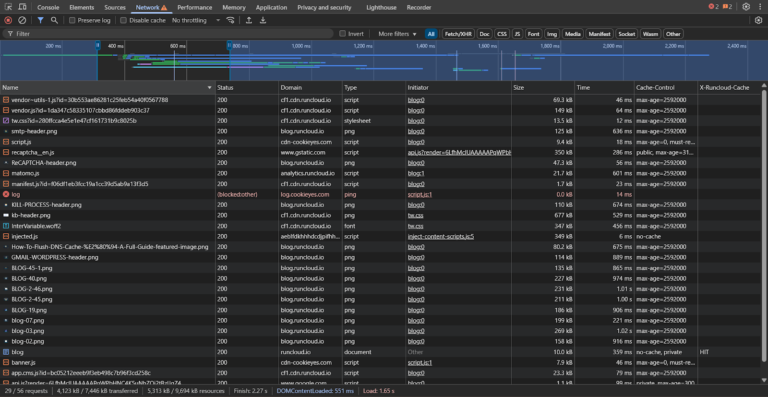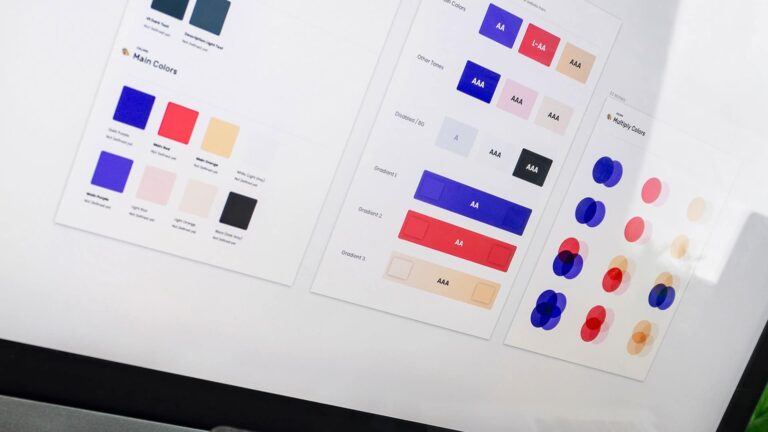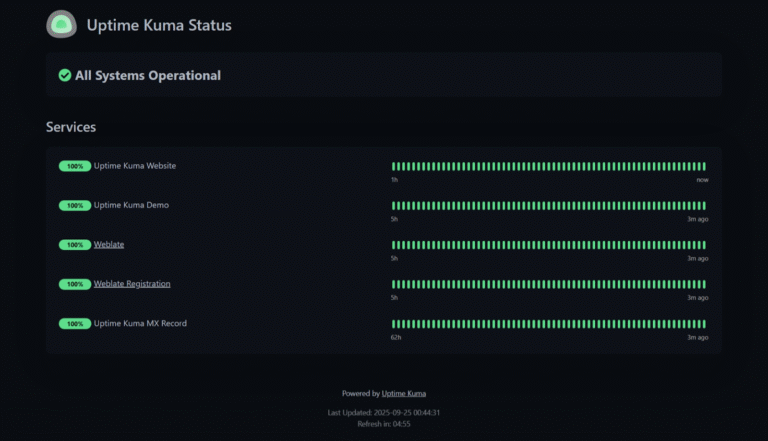You’ve probably encountered CAPTCHA at some point while browsing the web. It’s that annoying test that asks you to prove you’re human by solving a puzzle, typing some letters, or clicking on some images.
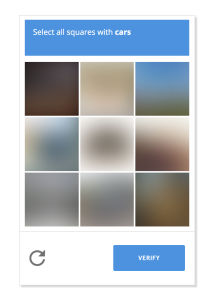
Captcha is supposed to protect your website from spam and abuse, but it can also drive away your visitors and customers.
It can be frustrating, time-consuming, and discriminatory for some users, especially those with disabilities or low internet speed.
In fact, CAPTCHA can reduce your website’s conversion rate by up to 3.2%!
But what if we told you there’s a better way?
A way to protect your website from bots without annoying your users. A way to improve your website’s user experience, security, and accessibility. A better way to distinguish between bots and real users.
In this article, we will show you some of the top alternatives of Google’s reCAPTCHA service that you can use on your website today. These alternatives are easy to implement, effective, and user-friendly.
Read on to find out more!
Top Alternatives to reCAPTCHA for Web Developers
Contents
Cloudflare Turnstile
Cloudflare Turnstile is a strong contender against Google’s reCAPTCHA. It is easy to use, mobile-friendly, and customizable, and it can be easily integrated into your website using a simple JavaScript snippet.
The best part is that Turnstile can validate users without any visual puzzle – significantly improving the user experience. It is also WCAG 2.1 Level AA compliant, making it accessible for users with disabilities. Cloudflare promises to protect the privacy of your users and never harvests data for ad targeting – similar can’t be said for other providers.
Pricing: Cloudflare Turnstile is currently free for up to 10 widgets. If you want to use more than that, you need to sign up for Cloudflare’s Enterprise plan.

hCaptcha
hCaptcha uses image-based challenges to verify human users. Users need to select the images that match a given criterion, such as “select all the cars”. hCaptcha claims to collect zero personally identifiable information, and so it automatically satisfies all privacy standards such as GDPR, CCPA, and HIPAA – making it more secure and privacy-friendly than reCAPTCHA, as it doesn’t track user data or serve ads.
Although visual tests are convenient tools for distinguishing bots, not everyone can solve a visual challenge. hCaptcha provides advanced accessibility options for serving not just people with visual impairments but also those with auditory processing issues. It is WCAG 2.1 Level AA compliant and offers features such as an accessibility cookie to help users bypass challenges. You can change the difficulty level of each challenge to make it easier or harder for your visitors to solve CAPTCHAs.
Pricing: It is free for up to one million requests per month. Beyond that, you need to contact customer support for custom pricing.

Friendly Captcha
Friendly Captcha is a CAPTCHA solution that uses proof-of-work to verify human users. Instead of asking visitors to solve puzzles, a small computation runs in the browser to generate a proof-of-work token in the background. This makes the process invisible to users and removes the need for visual or audio tests.
It supports a range of frameworks, including React, Node.js, and Vue, and can be integrated with a simple JavaScript widget. For organisations prioritizing privacy, Friendly Captcha is fully GDPR-compliant and operates EU-based data centres to ensure that personal data is not tracked or stored.
The service also meets accessibility standards such as WCAG, meaning it works with screen readers and other assistive technologies, and can be used without creating additional barriers for people with disabilities.
Pricing: Friendly Captcha offers four paid plans starting at €9 per month, with different options for security, scalability, and support. Plans vary in the number of protected domains, monthly request limits, and available features. A free non-commercial plan is also available for low-traffic websites.
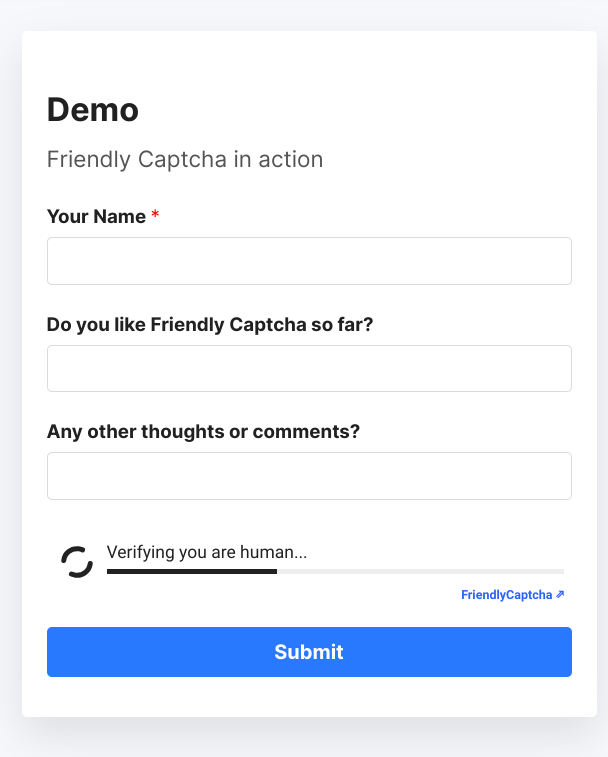
Altcha
ALTCHA is more than just a CAPTCHA alternative. It is a complete solution for protecting your website and online services from spam and abuse, while respecting your users’ privacy and experience. Instead of asking users to select the correct image, it uses a proof-of-work mechanism to validate users. With ALTCHA, you can:
- Reduce server load and bandwidth by preventing bots and malicious actors from accessing your website and online services.
- Enhance security and privacy by using a self-hosted, open-source solution that does not rely on third-party servers, cookies, or fingerprinting, and does not track your users or their behavior. ALTCHA is also WCAG 2.2 Level AA compliant, offering accessible alternatives to visual challenges.
- Customize and brand the widget to match your website’s look and feel, and adjust the difficulty of the proof-of-work challenge to suit your needs and preferences.
- Support humans and robots by using a machine-to-machine (M2M) verification system that allows automated systems to access your APIs and online services in a controlled and secure manner.
Pricing: Thanks to its permissive MIT license, ALTCHA is free to use and free to modify. You can use it without charge on unlimited websites and online services, with no restrictions or limitations.
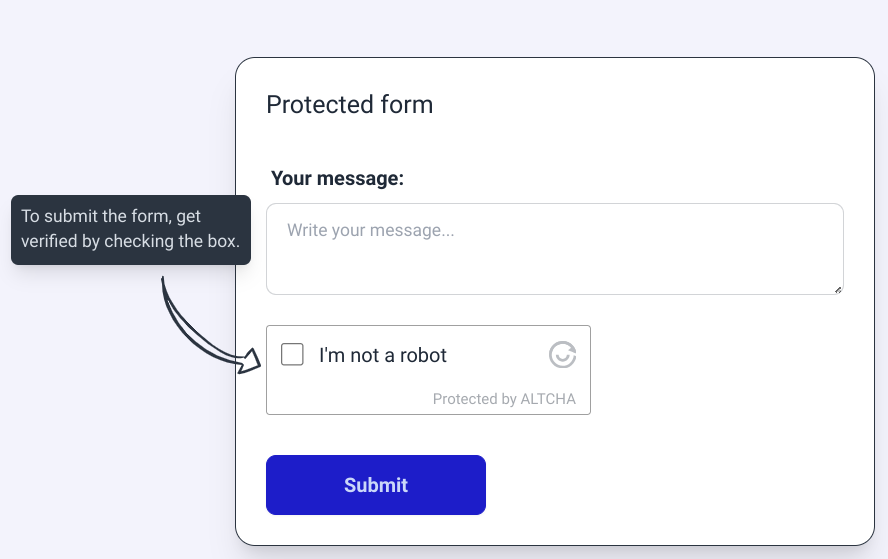
SVG Captcha
If you want a simple solution or if you’re a fan of older-style CAPTCHA, SVG Captcha is a great option for blocking automated traffic. It uses scalable vector graphics (SVG) to generate text-based challenges.
Although this is one of the simplest forms of CAPTCHAs, it is still pretty useful, and you can use it in multiple ways. For example:
- You can challenge users to type the text they see in the SVG image.
- You can ask users to come up with the next character in a predictable sequence, such as multiples of 2.
- You can ask visitors to compute the results of simple math problems.
- Alternatively, if your visitors are fluent in English, you can ask them puzzles such as “how many vowels are present in the given word.”
- You can also present visitors with simple math equations, such as “3 + 2 = 9,” and ask them whether they are true or false.
SVG Captcha is more lightweight, flexible, and creative than CAPTCHA, which doesn’t use bitmap images or fonts. It also supports various options, such as noise, size, color, and style. You can integrate SVG Captcha into your website using a Node.js module.
Pricing: It is open source and available under the MIT license.
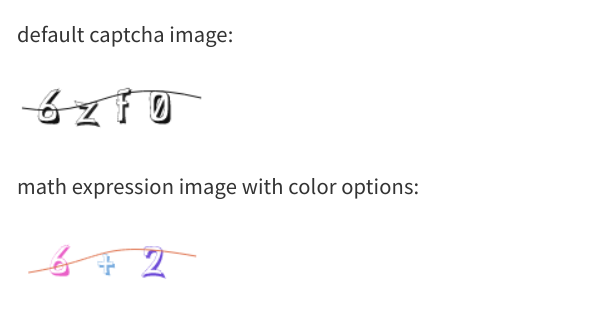
AWS WAF Captcha
AWS WAF can deliver and validate CAPTCHA challenges for web requests that match your firewall rules. It is WCAG-compliant and supports accessibility features such as an audio CAPTCHA option. You can integrate AWS WAF Captcha into your website using Application Load Balancer, Amazon API Gateway, or AWS AppSync resources.
AWS WAF Captcha allows you to customize the behavior and appearance of the CAPTCHA challenges, such as the difficulty level, the expiration time, the retry limit, and the theme. You can also use AWS WAF Managed Rules, such as AWS WAF Bot Control or the Amazon IP Reputation list, to trigger CAPTCHA challenges for suspicious requests. It can be a good solution if you already use AWS to manage your cloud resources.
Pricing: AWS WAF charges you for two events: CAPTCHA attempts and challenge responses. A CAPTCHA attempt occurs when a user solves a CAPTCHA and sends it to AWS WAF for verification, and it costs $4.00 per ten thousand attempts analyzed. A challenge response occurs when a user is shown a challenge page by AWS WAF due to a suspicious request, and it costs $0.40 per million responses served.
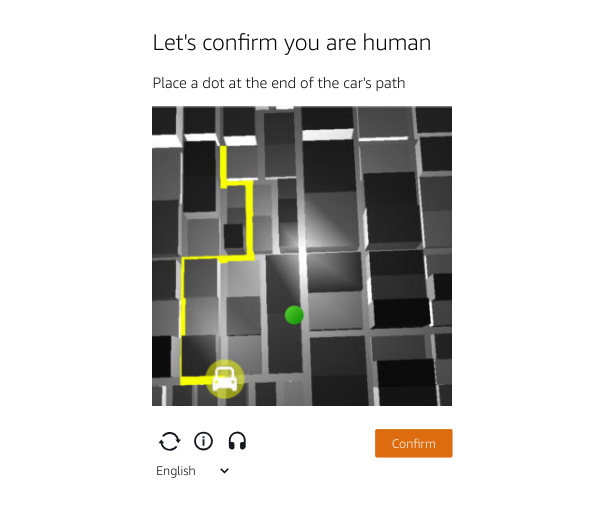
GeeTest Adaptive CAPTCHA
Geetest adaptive CAPTCHA is a powerful and user-friendly online security and verification solution. It offers a variety of CAPTCHA challenges that can adapt to different scenarios and preferences. The WCAG-compliant service works with major screen readers, including ChromeVox, VoiceOver, NVDA, and JAWS.
You can customize the interface style, language (78 different languages supported), and animation style of the CAPTCHA. You can also easily customize the type and difficulty of the CAPTCHA challenge that you want to use.
We particularly like Slide CAPTCHA, a classic and popular option that requires users to drag a slider to match a puzzle piece. Icon CAPTCHA is another fun and interactive option that challenges users to select icons in the correct order.
Pricing: Sign up for a free trial, and a sales representative will contact you.
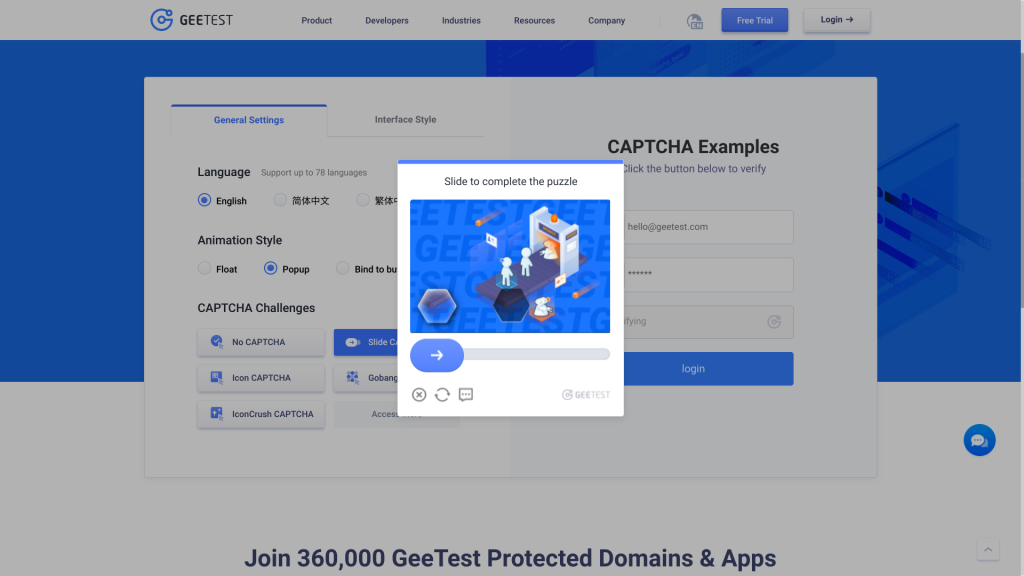
Lemin Captcha
Lemin Captcha is a CAPTCHA service that uses games and puzzles to verify users and secure websites. It is fun, easy, and accessible for users, and it also prevents bots, fraud, and spam on websites.
Unlike other CAPTCHA services that ask users to click on images or type words, Lemin Captcha makes security enjoyable and engaging. Users can solve puzzles that are suitable for their skill level and preference. You can customize the style and theme color of the CAPTCHA to match your website or app design. It also respects users’ privacy and security by generating anonymized user IDs.
Pricing: First 5,000 images are free every month, beyond which you will be charged $0.001 per puzzle image.

MTCaptcha
MTCaptcha is a CAPTCHA service that uses proof of work to prevent automated attacks on websites. Proof of work is a computation that makes attacks more difficult, expensive, and slow. MTCaptcha’s proof of work is adaptive, meaning that it adjusts to the risk level of the user and the network.
For most users, proof of work is invisible and fast, but for suspicious users or regions, it becomes harder and longer. Proof of work can protect against brute-force attacks on passwords, keys, or IDs, but not against network-layer attacks.
MTCaptcha is also compliant with GDPR and WCAG 2.0/2.1 AAA standards and offers features such as invisible CAPTCHA, adaptive CAPTCHA complexity, multi-user account management, and automated regression test support.
Pricing: It is free for one fully qualified domain name, after which you need to pay $85 per site, per month.
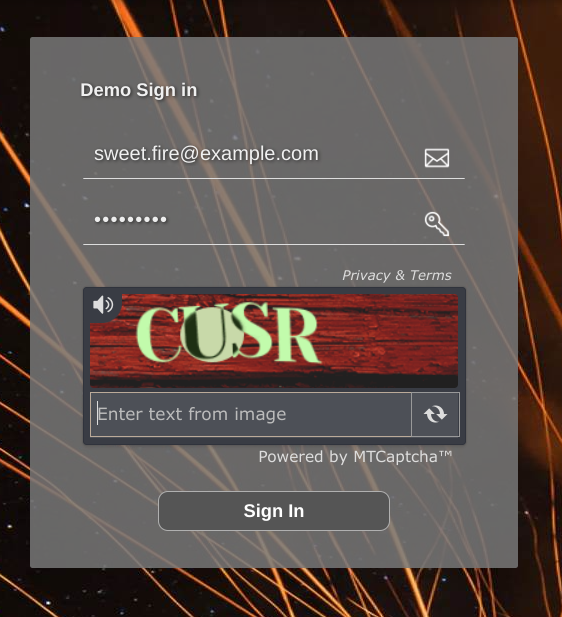
DataDome’s Device Check
DataDome offers Device Check, a tool that verifies the end user’s device and environment without any user interaction. Device Check can detect and block automation frameworks, spoofed environments, and programmatic access to user interfaces. It can also ensure the device’s authenticity by executing a proof of work and a fingerprinting challenge.
Device Check runs on web browsers and mobile applications and respects the end user’s privacy by minimizing data collection. It is also advertised as WCAG 2.2 AA compliant. Device Check is like a CAPTCHA but without any challenge to the end user. It only challenges the requester if the check’s result is inconclusive.
Pricing: There is no free plan – the business plan starts at $3,690 per month for up to 100 million requests.
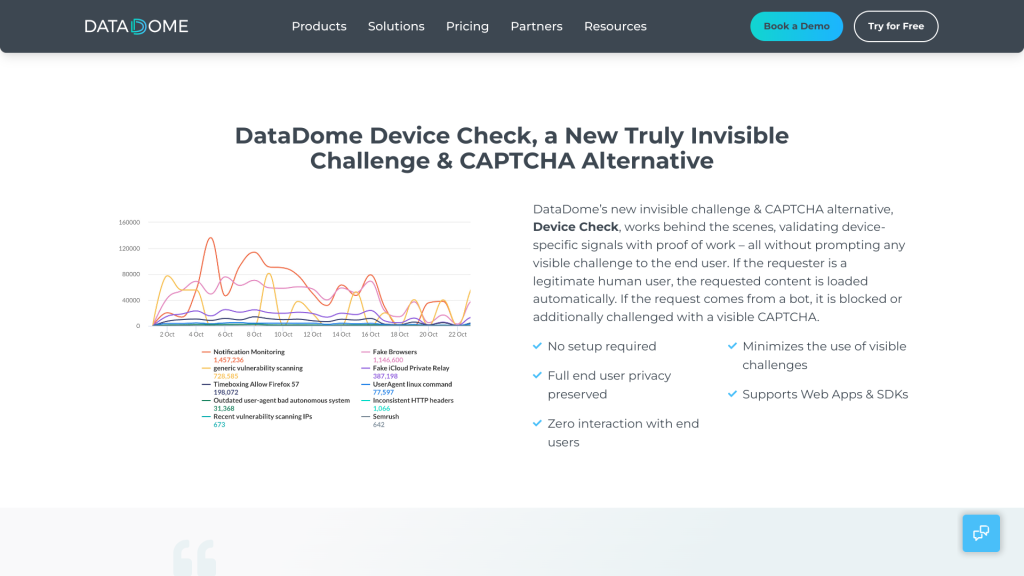
Capy Puzzle CAPTCHA
Capy offers a product called Capy Puzzle CAPTCHA, which is designed to protect websites from brute-force attacks and spam bots that attack passwords. Capy Puzzle CAPTCHA uses a puzzle-based mechanism that is easy for humans to solve but hard for computers to crack. It also allows website owners to customize the appearance and style of the puzzle and monitor the website’s security status with statistical data.
It claims to reduce the user termination rate by 10% compared to conventional text-based CAPTCHA. Capy offers six different levels of security. You can choose the most appropriate level to strengthen the security or make it easier for users to pass the challenge.
Pricing: Capy offers a 30-day free trial, and you can request an estimate by emailing them a monthly page view count or by providing an estimate of the number of CAPTCHA displays.
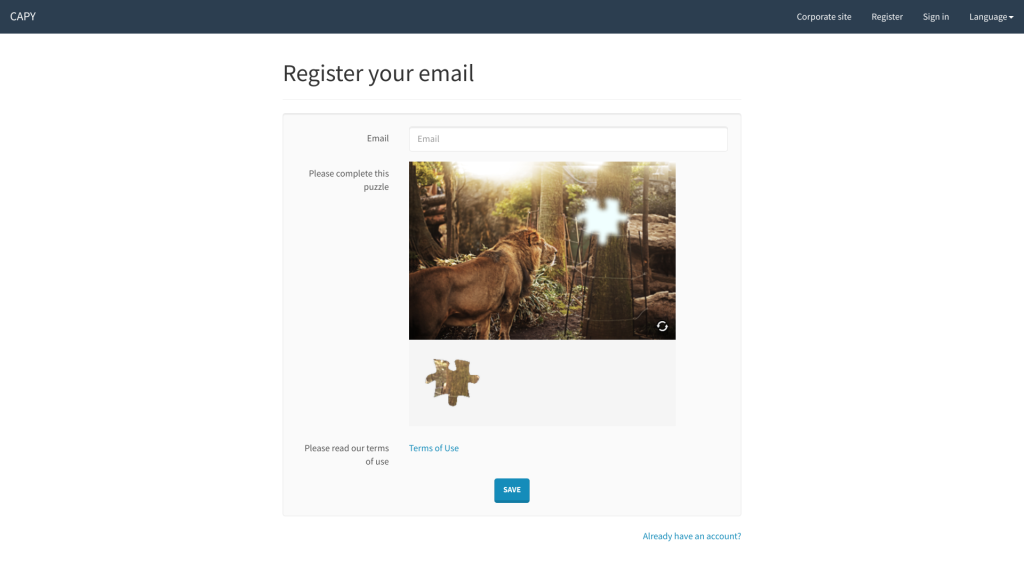
Other Alternatives
Although using CAPTCHA is one way to solve your bot problem, it is not the only solution. Besides the above-mentioned alternatives, there are some other ways to prevent bots from accessing or submitting web forms, such as:
- Use passkeys: You can generate a unique passkey for each user session and embed it in a hidden field in your web form. You can then validate the passkey on the server side before processing the form data.
- Send SMS/email: You can send a verification code to the user’s phone number or email address and ask them to enter it in your web form. You can then verify the code on the server side before processing the form data.
- Hidden field detection: You can add a hidden field in your web form that is not visible to human users but can be filled by bots. You can then check if the hidden field is empty or not on the server side before processing the form data.
Final Thoughts
Differentiating between automated users and humans is essential to protect your website. In this post, we highlighted that Google’s reCaptcha is not the only way to protect your website from bots. There are many alternatives that offer better user experience, security, and accessibility. You can choose the one that suits your needs and preferences.
However, CAPTCHA alternatives are not the only thing you need to consider when developing your website. You also need to think about how to manage your cloud infrastructure, which can be complex and time-consuming.
That’s why we recommend using RunCloud, a cloud-based platform that makes it easy to deploy, manage, and scale your websites. With RunCloud, you can:
- Create and launch your websites in minutes, using any PHP framework or CMS of your choice.
- Monitor and optimize your website performance, security, and reliability, using a simple and intuitive dashboard.
- Scale your websites with confidence, using features like Atomic Deployment, Firewalls, and backups.
RunCloud is the trusted solution for web developers who want to focus on shipping great work, not managing their cloud infrastructure. Whether you are a beginner or an expert, RunCloud can help you create and manage your websites faster and better. We support all major cloud providers, such as AWS, DigitalOcean, Google Cloud, and more.
Don’t waste time and money on complicated and expensive cloud infrastructure. Try RunCloud today for 7-days – free of charge!


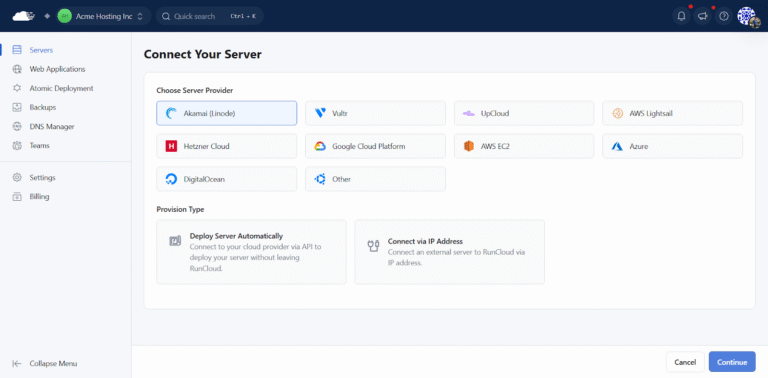
![How to Create a Public Status Page for Your Website [FREE]](https://linuxpunx.com/wp-content/uploads/2025/10/how-to-create-a-public-status-page-for-your-website-free-768x400.png)
